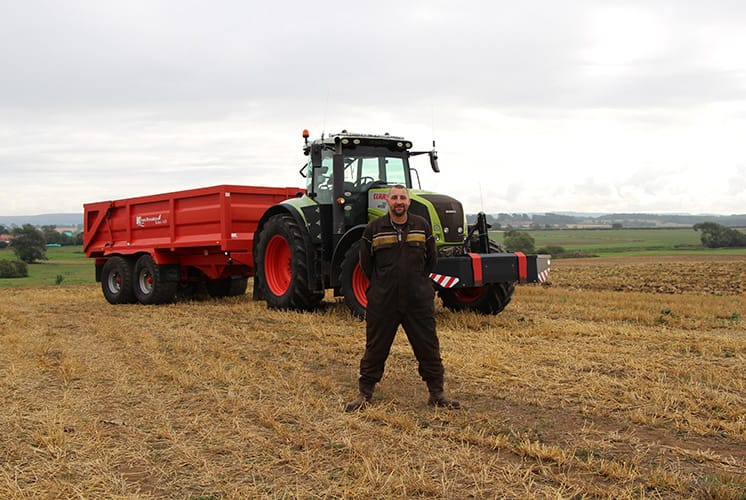A recent engine remap has reduced fuel consumption by 3l/hr on a Chris Rodgers’ Claas Axion 810 and allowed him to haul loads at a lower rpm helping him trim fuel costs.
Mr Rodgers operates a contracting service around his base in Northallerton, North Yorkshire. The works involves hauling bales, grain and grass during harvest, as well as hedge cutting and verge mowing – he bought his 2010 Claas Axion 810 on 4,200 hours after trading in an older Claas Ares in 2020 that had passed 10,000 hours.
However, although the Axion 810 offered him an upgrade on his previous tractor, he found it was underpowered on certain tasks, notably when hauling construction equipment on a 27t low loader trailer. He spoke to Kearsley Agri Services who had recently become an Avon Tuning authorised agent for the professional engine remapping service.
Fuel saving
After talking about what was available to him, a remap was installed taking power from 203hp up to 241hp and torque was increased by 305Nm to 1908Nm. The output was then tested on the dyno to ensure all software additions have taken effect and the tractor is operating as it was before, however it is the fuel saving that has been the biggest surprise.
“I’m using around 3l/hr less fuel than I was beforehand when I’m hauling grain or grass, which is a large part of my work. My fuel bill has reduced and I’m putting in less diesel every evening. I also charge some jobs on price per litre, so my customers are making a saving as well.”
Mr Rodgers said that he has compared his fuel use to other tractors without remaps and his Axion has come out favourably. When hauling grain next to a Case Puma 160, the fuel use of both tractors remained similar throughout the full day, however the Claas Axion 810 was pulling a bigger trailer with 2-3t extra in every load, which helped increase efficiencies thanks to the fuel saving.
“When I drove home after the remap I couldn’t go through the gears quick enough, it had made a big difference to the tractor’s output throughout the rpm range. It was the same when I started hauling, some of the hills that I had to drop down four or five gears in the past to get up, I would now only have to drop two.”
The technology alters the way the fuel is delivered so the tractor can offer the same output at a lower rpm, which meant the fuel saving benefits were able to be achieved. Mr Rodgers does a lot of trailer work with 14t K-Two silage and grain trailers; an 18t NC dump trailer; and a 27t triaxle low-loader for bale carting and digger moving.
Cautious approach
Although the remap has been a success, Mr Rodgers had heard stories of engine tuning that resulted in machinery failures, something he couldn’t afford with only one tractor on the books.
“Reliability is essential for me, and after talking to Pete Kearsley at Kearsley Agri Services, I was happy that the professional remap offered by Avon was very different to some of the arrangements I’d heard of in the past. The backup and software guarantee offered reassurances, as did the original map being saved for future use if I needed it.”
The Avon remap changes the engine’s characteristics at the ECU, rather than interrupting the signal. Alterations are made within the engine’s limits and not exceeding the limiting component on the tractor, which may not always be the engine. Each model is assessed on an individual basis and maps tailored to meet the specific requirements of the customer and the tractor’s capabilities.
A test on the Dimsport dyno at Kearsley Agri Services before the remap helped to identify any mechanical issues or fluctuations in power delivery. Mr Rodgers says that he would add a remap to his next tractor, but only after having it tested on a dyno beforehand.
“Maximising my current machine has been a huge benefit and is saving me money in fuel use, I would do it again on my next tractor. However, I think it is essential to know your tractor’s output before any work is done though, as the repercussions of remapping a poorly engine could be costly,” adds Mr Rodgers.

